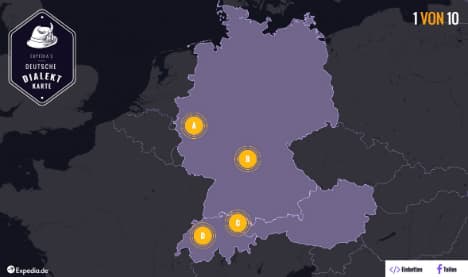Can you tell a Bavarian dialect from a north German one?

From north to south, east to west, the German language varies significantly - travel site Expedia's new quiz is a pretty neat way to demonstrate this.
German is the native language of around 90 million people in the world, according to Encyclopaedia Britannica, meaning it probably has the sixth highest number of native speakers worldwide (after Chinese, English, Hindi-Urdu, Spanish, and Russian).
But that doesn’t necessarily mean a native German could understand all 90 million of these people - German is famed for its significantly varied dialects.
Expedia has developed a quiz to test you, and it gives you the location of and information on each of the 24 dialects included.
How different can they be? And how difficult can it be to tell where they come from?
CLICK HERE to have a go.
 . Photo: Expedia
. Photo: Expedia
Dialects are distinct from accents, as a dialect is normally linguistically different – often both in spoken and written form – not just in its pronunciation.
For example, Swiss German (or Schweizerdeutsch) is virtually incomprehensible for someone from Berlin, and someone in Salzburg, Austria, will sound very foreign to someone from Germany’s north coast.
 Four different places, four very different dialects. Clockwise from top left: Salzburg, Austria; Mürren, near Berne, Switzerland; Rostock, Mecklenburg-Western Pomerania; Schleiz, Thuringia. Photo: Wikimedia Commons (Jiuguang Wang; Ximonic; An-d; Lysippos)
Four different places, four very different dialects. Clockwise from top left: Salzburg, Austria; Mürren, near Berne, Switzerland; Rostock, Mecklenburg-Western Pomerania; Schleiz, Thuringia. Photo: Wikimedia Commons (Jiuguang Wang; Ximonic; An-d; Lysippos)
Of course, most German speakers can now speak ‘Standard German’, or Hochdeutsch, literally 'high German'. This is a standardized form of the language, which has a German, Austrian, and Swiss variety, but is easily understandable across all three.
Children are taught to understand and to write it from a young age. In Switzerland, for example, children must learn Swiss Standard German from the age of six, and normally achieve a high level both in written and spoken language.
However, if you enter a local bar in the different corners of German-speaking Europe, you may well find it difficult to catch anything they’re saying.
Comments
See Also
German is the native language of around 90 million people in the world, according to Encyclopaedia Britannica, meaning it probably has the sixth highest number of native speakers worldwide (after Chinese, English, Hindi-Urdu, Spanish, and Russian).
But that doesn’t necessarily mean a native German could understand all 90 million of these people - German is famed for its significantly varied dialects.
Expedia has developed a quiz to test you, and it gives you the location of and information on each of the 24 dialects included.
How different can they be? And how difficult can it be to tell where they come from?
CLICK HERE to have a go.
 . Photo: Expedia
. Photo: Expedia
Dialects are distinct from accents, as a dialect is normally linguistically different – often both in spoken and written form – not just in its pronunciation.
For example, Swiss German (or Schweizerdeutsch) is virtually incomprehensible for someone from Berlin, and someone in Salzburg, Austria, will sound very foreign to someone from Germany’s north coast.
 Four different places, four very different dialects. Clockwise from top left: Salzburg, Austria; Mürren, near Berne, Switzerland; Rostock, Mecklenburg-Western Pomerania; Schleiz, Thuringia. Photo: Wikimedia Commons (Jiuguang Wang; Ximonic; An-d; Lysippos)
Four different places, four very different dialects. Clockwise from top left: Salzburg, Austria; Mürren, near Berne, Switzerland; Rostock, Mecklenburg-Western Pomerania; Schleiz, Thuringia. Photo: Wikimedia Commons (Jiuguang Wang; Ximonic; An-d; Lysippos)
Of course, most German speakers can now speak ‘Standard German’, or Hochdeutsch, literally 'high German'. This is a standardized form of the language, which has a German, Austrian, and Swiss variety, but is easily understandable across all three.
Children are taught to understand and to write it from a young age. In Switzerland, for example, children must learn Swiss Standard German from the age of six, and normally achieve a high level both in written and spoken language.
However, if you enter a local bar in the different corners of German-speaking Europe, you may well find it difficult to catch anything they’re saying.
Join the conversation in our comments section below. Share your own views and experience and if you have a question or suggestion for our journalists then email us at [email protected].
Please keep comments civil, constructive and on topic – and make sure to read our terms of use before getting involved.
Please log in here to leave a comment.